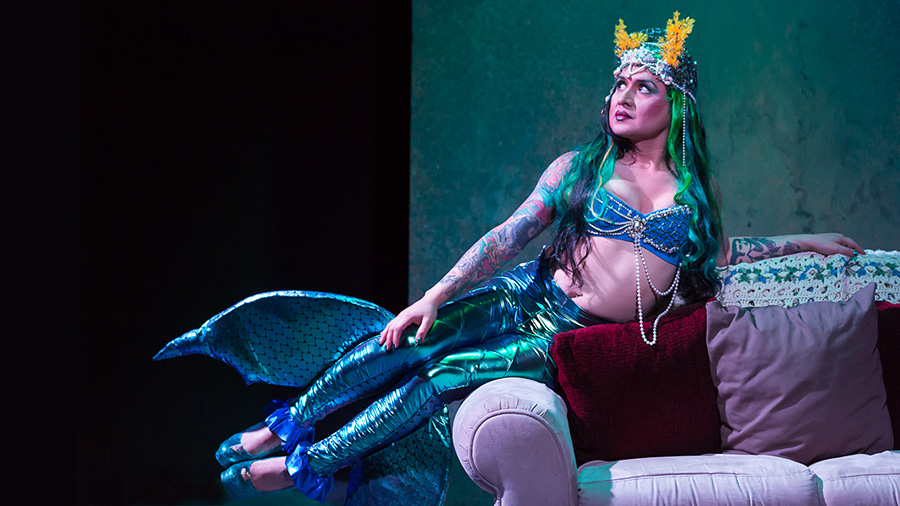A conversation with Michael Cavazos
While the actors reach the midway point of The Mermaid Hour, we thought we ought to explore the meaning behind the name of the show. The Merperson, played stunningly by Michael Cavazos, appears not only as a striking symbol of gender fluidity and binary-breaking beauty, but as an onstage character as well. We had a chance to ask Michael some questions about his part in the show, and to offer some perspective on this mysterious entity.
The Mermaid Hour is a part of a NNPN Rolling World Premiere, with three other productions happening parallel to Milagro’s. What is it like being an actor getting to originate a role for a show that has never been done before?
It’s a gift to have been cast in the role and to breathe a little bit of myself into this character. As a queer Latinx performer, I often think about the weight of representation. I believe it takes courage, strength, a true self-awareness and a steadfastness for a genderqueer person to live their life authentically and wholly, something I am still learning how to do in my own life. Crux is a role-model and an inspiration and yet they are not someone represented this way on stage very often. There is a tenderness in their encouraging words and a resolution to them that inspires me. I try to bring those qualities to my performance.
How do you relate to the themes of the show, and the message that it has to say? Do you have a background on this subject?
It resonates with me in many ways, especially when I think of gender, race and sexuality. In my own life, I identify with the term genderqueer as does my character of Crux/Merperson. Navigating a machismo culture as an effeminate Mexican-American boy in San Antonio was challenging. It was my single mother’s acceptance of who I am that helped me the most to get through some of the tougher times in my adolescence. She did what she could with the knowledge she had but more with the love and support she could provide. In that same way, we see Vi’s working-class parents doing the absolute best they can while fumbling and struggling to do right by their daughter and understand the complexities of the situation while wanting to love and nurture her as best they can.
In the show, you portray the Merperson, a magical character that transcends the binaries between and beyond gender. What is your process to becoming that character night after night?
The physical process of getting into makeup and costume has been very helpful in transforming me into the character. I do my own makeup so literally lock myself in a room, put on the music and voices of women I feel connected to culturally and who have a certain power in their voices, and begin the makeup process. I have been listening to everyone from Selena to Lila Downs. I also enjoy listening to the Greek-American artist Diamanda Galás, who has an especially eerie and powerful voice that feels otherworldly. The costume with it’s metallic sheen, though soft and malleable, reminds me a bit of armor, and I feel empowered by it. Then, reviewing the beautiful text, the poetry in it, always puts me into the right frame of mind.
Given the polarizing conversation around transgenderism in politics and society, why do you feel it’s important for this story to be told?
Trans rights are human rights. Trans stories have too long been hidden and denied. If stories of gender diversity are not shared, how do we expect to evolve as a people? I believe awareness and visibility are important for people to change their attitudes about things they may perceive as different. I do not want to “normalize” anything as I do not believe a trans, genderqueer or queer experience is the same as that of our cis heterosexual counterparts; however, the more these stories are shared the common humanity we share can be celebrated.
What have been your some of your favorite moments of working on this production?
This whole experience has been very positive. I have met many wonderful and talented people on this production. Our director Sacha Reich has been supportive and encouraging. The cast has been warm and has sought authenticity with their portrayals of these complex characters. Off stage they are also playful and quite funny, making each rehearsal a joy. It has also been wonderful to hear from audience members who this story is resonating with, especially those who identify as Latina/o/x and trans or genderqueer who are so moved by seeing someone who looks like them on stage in such a positive role. This gives me hope that more characters like this will be seen on stage at Milagro and beyond.

